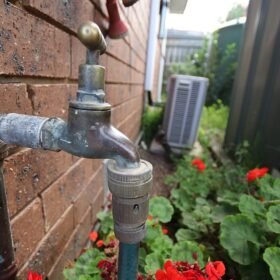Investing in residential rental real estate can be a lucrative way to increase your wealth, though it is not without its challenges.
If you are a current landlord looking for information on property management, you may have realized that managing your own property consists of much more than fixing an occasional leaky faucet and collecting the rent.
Perhaps you are contemplating entering the world of real estate investing by purchasing a rental property. If so, it’s essential to understand all the responsibilities that come along with becoming a landlord.
Nothing shatters the dreams of a glamorous passive income quite like a 2 am service call for a leaky toilet.
Maybe you currently have a full-time job that does not involve your property. Perhaps you have a family, or school, or any number of other significant demands on your time that make it a challenge to manage your property effectively.
You might start to wonder if it’s a wise investment of your time and money to own, let alone manage your properties.
What is a Property Manager?
A property manager performs the duties of a landlord but does not own the rental property.
In straightforward terms, they act as a middleman between the owner and the renter for a fee.
A property manager’s primary responsibilities include:
- Attracting, screening, and maintaining tenants
- Management of rent
- Collection of fees
- Handle evictions
- Property maintenance and repairs
- Maintains compliance with landlord-tenant laws
- Provide all mandatory notices
- Resolve tenant disputes
- Business operations
- Property records and accounting
- Taxes
- Supervise on-site employees like security personnel, cleaning or concierge
- Budgeting
A rental property owner hires a property management company to protect and maintain their investment. A property manager eliminates the need for a property owner to attend to daily tenant or property issues.
Property managers can also manage money and records for multiple owners, tenants, and properties while ensuring property owners follow federal, state, and local landlord-tenant laws.
Local property managers can offer flexibility and open up opportunities for REIs to purchase out-of-state rental properties they would otherwise have to pass on.
Do I Need a Property Manager?
Maybe you are a landlord that enjoys managing your investment properties, but you are just looking to streamline and modernize some of your current processes.
If you are currently maintaining one or two properties and are just looking for a bit of automation, you may benefit from a property management app.
However, if you are looking for more substantial support, keep reading to learn more about how partnering with a local property management company could help you build your business while lightening your load.

Property Managers Save You Time
Your time is valuable. Tracking rent payments, collecting late fees, finding new tenants, preparing for new tenants, being on call 24×7 for emergencies can all be a thing of the past.
Property managers are tasked with the responsibilities associated with the physical management and maintenance of the rental property. Still, they also handle the service end and act as a buffer between you and your tenants.
Property managers take the service calls when tenants have an issue. They either handle the problem themselves or coordinate the resolution and see the process from beginning to end.
Whatever is required to maintain a livable condition for current tenants regarding maintenance and repairs is carried out or coordinated by the property manager.
Inspections
A property manager will regularly inspect the rental unit to identify any maintenance issues that need to be addressed before they become expensive repairs or potential safety hazards.
Emergencies & Disasters
When an emergency or disaster strikes, property management companies have policies in place for both the property and the residents.
A property manager will typically offer backup systems including:
- Generators
- Fuel stockpiles
- Standby wireless internet service
- Access to multiple cell phone providers
Depending on the nature and severity of the emergency, a property manager may have to “act” to prevent financial risk to the owner if the owner is not available.
Maintenance
Property managers will handle all of the routine and preventive maintenance to make sure the property remains in excellent condition.
Maintenance can include:
- Landscape duties
- HVAC servicing
- Exterior cleaning
- Gutter cleaning
- Snow removal
You will get a chance to review and customize the services you will need when you meet with potential property managers.
Repairs
Necessary repairs may be discovered by management during an inspection or brought to the manager’s attention by a tenant. However an issue is found, a property manager can make it easy for you.
If your property needs repairs, a property manager will communicate the issue to you. Upon approval, a manager will schedule the repairs.
If you are not engaged in managing your property on a full-time basis, building and maintaining relationships with reliable, quality vendors and contractors can be difficult.
A property manager will have relationships with established and reputable contractors to handle the most common repairs, such as:
- Plumbing and HVAC system repairs
- Painting
- Broken railings
- Common area light bulb replacement
A good property manager will know who to call in the middle of the night. They will also stay within your budget when overseeing any work to be done.
Whether you are working with a property manager that will perform maintenance and repair tasks personally, via on-site management, or hire a vendor to complete the job, the 2 am leaky toilet call is covered without you losing a wink of sleep.
Property Managers Know the Market
An experienced management company uses market studies to set the right rental price for your properties. They can take the guesswork out of achieving the all-important balance between maximizing income and minimizing vacancy rate.
Set the Rent
It’s no secret that the supply and demand in an area will determine rental rates. Property managers stay on top of the market in the area to advise owners how to stay competitive in the current rental market.
They will set the rent to be competitive and handle the tenant screening and application process.
Marketing Rental Vacancies
Every landlord, real estate investor, and property manager knows all too well that a vacant unit is just bad for business.
Marketing is one of the main functions of a property manager.
A property manager will handle all aspects of getting your rental on the market:
- Advertising
- Signage
- Schedule tours
- Screen and approve tenants
- Draft and execute applications and leases
Some property managers offer vacancy guarantees for units that remain open longer than an agreed-upon timeframe.
Manage Tenant Turn-Over
Tenant turnover can wreak havoc on your profits if you don’t have a fast, efficient process to get a property restored to rent-ready condition between lease terms.
When a property sits vacant, a solid property management pro knows how to find qualified new tenants quickly, decreasing income loss due to vacancy.
A property manager will oversee move-outs:
- Enforce move-out dates and charge tenants accordingly
- Collecting keys and leased property
- Refunding the past tenant’s security deposit
- Prepare vacant units
The vacated unit must be inspected, cleaned, and restored back to its condition at the beginning of the prior lease.
As the property owner, if you want to make additional improvements to the unit during the time, the manager can help coordinate and oversee the property maintenance.
Tenant Screening
Detailed screening is crucial to successful property management.
Most property managers will request verifiable income information to show prospects can maintain the rent and utilities for the property.
Rental history or previous home ownership, along with a credit application, provides a solid foundation for choosing whether or not to accept an application.
You can typically rely on property managers to deliver tenants who:
- Pay their rent on time
- Are responsible and reliable
- Take care of your property
- Do not cause problems
- Are easy to reason with
- Plan to reside there longer
Property Managers Know the Law
The COVID crisis has caused changes in the federal and state laws regulating tenant-landlord relationships.
Are you confident that you have the most up-to-date information?
Confident enough to risk your investment and financial future?
A single lawsuit from an angry tenant can cost you thousands of dollars in legal fees, and that’s if you win.
Here are just a few of the regulatory agencies that you will need to stay compliant with:
- Fair Housing (HUD)
- Equal Opportunity
- SCRA Act – Serviceman’s Civil Relief Act (Formerly the Soldiers’ and Sailors’ Act of 1940)
- URLTA – Uniform Residential Landlord-Tenant Act
- EPA – Environment Protection Agency
- Other local or state laws that may apply to your specific city
Ensuring that you stay in compliance with all applicable state and federal laws is critical if you want to be a successful property owner and avoid legal hassles.
With a comprehensive understanding of all the state and federal laws regarding discrimination in screening and selecting tenants, property managers avoid breaking discrimination laws.
If an eviction becomes necessary, an experienced property manager will know how to handle it within the boundaries of the law.
You Can Make More Money With a Property Manager
While you may have been avoiding working with a property manager because of the cost involved, you can see that the investment covers many tasks that make running rental properties stressful.
With a property management company handling the day-to-day operations of your rentals, you have time to shop for additions to your portfolio.
Before you know it, that fee you thought you could not afford could result in a thriving REI business for you.








